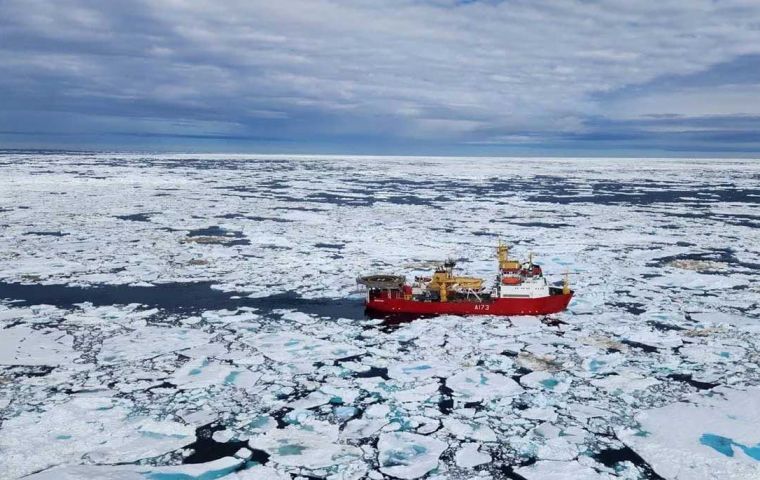MercoPress. South Atlantic News Agency
HMS Protector crosses Panama Canal as it prepares for Antarctica's 2024/25 season
 The ice patrol sailed through the Hudson Strait into Hudson Bay – the inland sea indenting east-central Canada – to carry out two weeks of ice-breaking operations (Pic RN)
The ice patrol sailed through the Hudson Strait into Hudson Bay – the inland sea indenting east-central Canada – to carry out two weeks of ice-breaking operations (Pic RN) The Royal Navy’s ice patrol ship HMS Protector is swapping the high north for the deepest south after completing a successful mission to Canada’s polar waters. The Plymouth-based survey and scientific vessel usually patrols the Antarctic, but occasionally to Arctic climates to certify that she is able to operate in the icy northern regions, which are vastly different to work in despite their visual similarities.
Protector is now bound for a transit of the Panama Canal before a period of maintenance ahead of her first patrol of the Antarctic during the 2024-25 ‘season’.
The ice breaker sailed through the Hudson Strait into Hudson Bay – the inland sea indenting east-central Canada – to carry out two weeks of ice-breaking operations in northern polar waters, for the first time since 2022.
Primarily, Protector’s deployment to Hudson Bay provided important training in navigating this unique region but also saw the forging of closer bonds with the Canadian Coast Guard, which operates more than 20 icebreakers across the Arctic.
The Canadian Coast Guard’s Captain Duane Barron joined HMS Protector for their mission, sharing his wealth of knowledge with the ship’s officers, as they navigated through ice and fog.
Into the Pacific! On our way south to Antarctica, Protector passed through the impressive Panama Canal, achieving a top sailors’ bucket list location! Video credit @ AB Horner. #lifeasasailor pic.twitter.com/Wy8iVuHAe8
— HMS Protector (@hmsprotector) August 18, 2024
Commanding Officer, Captain Tom Weaver, said: “This was a great opportunity to operate at the opposite end of the world than we are used to and hone our ice-breaking skills with the help of the Canadian Coast Guard.
“In the north we saw vast floes of sea ice, moving with the winds and the strong currents, some of it formed last winter, some of it formed many years ago, getting harder with age.
“In Antarctica we see more icebergs and ice from glaciers that is thousands of years old and hard as concrete. In both places you need to know what you are looking at to avoid getting into trouble, so ice training in different conditions is always valuable.”
Protector also observed a wide array of wildlife during her northern mission, including seeing a polar bear and her cub on a fresh Arctic morning.
Completing her time in the Arctic, Protector stopped in Quebec City, joining a group of allied ships which opened their gangways to visitors, including the US Navy’s USS Carney, Canadian ships HMCS Fredericton, HMCS William Hall and French ship FS Rhone.




Top Comments
Disclaimer & comment rulesCommenting for this story is now closed.
If you have a Facebook account, become a fan and comment on our Facebook Page!